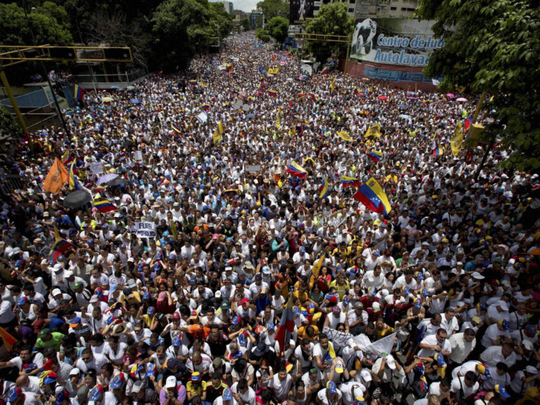
Caracas, Venezuela: Francisco de Miranda Avenue, one of three main streets in the Venezuelan capital Caracas, brimmed with thousands of protesters on Thursday. Most of them are dressed in white and chanting "No more socialism," "Maduro Out," and "Venezuela wants a recall."
Marchers said life in Venezuela has become a daily ordeal of standing in endless lines for food, for government services, for medical care.
Protesters filled dozens of city blocks in what was dubbed the "Taking of Caracas" to pressure electoral authorities to allow a recall referendum against Maduro this year.
Protesters, dressed mostly in white and carrying Venezuelan flags, chanted, "It's going to fall, it's going to fall, the government is going to fall."
Pictures: Anti-Maduro protests hit Venezuela
The demonstration, aimed at speeding up a recall campaign against the 53-year-old president, was also a forceful repudiation of the leftist politics that are falling out of favour across Latin America.
At its peak in 2008, the left held the presidencies of eight of the 10 most populous countries in South and Central America.
But those regimes have lost popularity as steep drops in commodity prices badly damaged their economies and left less money to spend on the poor.
Now, Venezuela's opposition vows to keep up pressure on Maduro after flooding the streets of Caracas with demonstrators Thursday in its biggest show of force in years.
Tense
The buildup to the protest was tense. Maduro's government jailed several prominent activists, deployed security forces across the city and warned of bloodshed.
A small group of protesters, some of them wearing masks and throwing rocks, squared off with riot police as the rally was ending.
Police used tear gas to break up the crowd and arrested a few youth.
Maduro told a much smaller rally of state workers and hard-core supporters that opponents are plotting a coup such as the one that briefly toppled his late predecessor Hugo Chavez in 2002.
He said authorities had arrested people possessing military fatigues and C4 explosives, and who had plans to fire upon the crowds dressed as national guard members.
"Today we've defeated a coup attempt that sought to fill Venezuela and Caracas with violence and death," Maduro told his supporters without providing details about the accusations. "We're still looking for several criminals that paid to massacre the people."
Caracas political analyst Dimitris Pantoulas said the "warlike" language may have actually energised opponents who otherwise might be on vacation or, at a time of economic crisis, standing in long lines for food.
"The government made a big mistake by throwing fuel onto the flames," said Pantoulas.
As the rally was wrapping up, the head of the opposition Democratic Unity alliance outlined the next steps in its campaign to force Maduro from office.
"Today is the beginning of the definitive stage of our struggle," Jesus Torrealba told supporters.
Issues
He called for a nationwide demonstration of pot-banging Thursday night to protest growing hunger.
There are also plans for two more street protests, including one Sept. 14 coinciding with the arrival of heads of state from around the world for a summit of the Non-Aligned Movement taking place on the Caribbean island of Margarita.
"This isn't the country I grew up in and it's not the one I want my children to live in," said Olga Delgado, a school administrator, who arrived to the protest on crutches following hip-replacement surgery. She was wearing a hat reading "I am squalid," appropriating for herself one of Chavez's favorite taunts for his opponents.
Maduro tried to mock his opponents' show of force, saying they had failed to amass more than 30,000 supporters and joking that he and First Lady Cilia Flores would go the movies at a shopping mall near where they were gathering.
The opposition had staged a half-dozen or so marches this year, some of which ended in clouds of tear gas as hard-core activists clashed with riot police, but they posed no major risk to Maduro's grip on power.
Huge numbers
Even the anti-government protests in 2014 that were blamed for more than 40 deaths failed to rally the huge numbers seen Thursday.
The opposition hopes to force electoral authorities widely seen as pro-government to allow a recall vote this year. If Maduro loses, new elections would be held and polls indicate the opposition would win. But if a vote is delayed until after Jan. 10 and Maduro loses, his vice president would finish his term ending in 2019.
Electoral authorities have yet to set the date for the next stage of the complex process, in which the opposition must collect 4 million signatures over three days, with a referendum vote scheduled only once the signatures are validated.
Authorities over the weekend moved a prominent opposition leader, former San Cristobal Mayor Daniel Ceballos, from house arrest back to prison while he awaits trial on civil rebellion charges stemming from the 2014 protests. Authorities said he was plotting to flee and carry out violence during the protests.
Two other activists, Yon Goicoechea and Carlos Melo, were also detained this week, with a top socialist leader accusing Goicoechea of carrying explosives.
There have been more subtle threats as well. Government workers say they've suffered retaliation for signing petitions seeking Maduro's removal and a half-dozen foreign journalists who traveled to Venezuela to cover the protests were also deported, including a correspondent for the Miami Herald.












